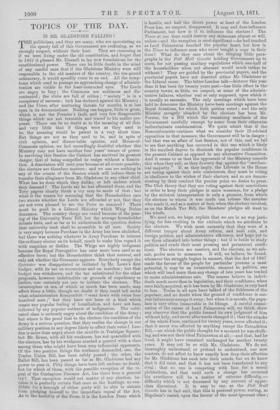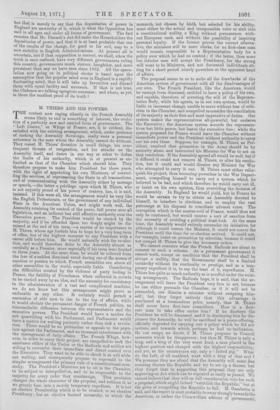TOPICS OF THE DAY.
IS MR. GLADSTONE FALLING ?
THE politicians, and they are many, who are speculating on the speedy fall of this Government are reckoning, as we
strongly suspect, without their host. They are reasoning as if we were living under the old constitution, and forget that in 1867 it pleased Mr. Disraeli to lay new foundations for the constitutional power. There can be little doubt in the mind of any candid man that if the Gladstone Ministry were still responsible to the old masters of the country, the ten-pound aristocracy, it would speedily come to an end. All the symp- toms which used to presage an approaching change of adminis- tration are visible to the least-instructed eyes. The Lords are angry to fury ; the Commons are mutinous and dis- contented ; the clubs are full of critics ; " society " is in a conspiracy of sarcasm ; luck has declared against the Ministry ; and the Times, after muttering threats for months, is at last open in its denunciations. Nothing can happen, little or groat, which is not the Premier's fault, and very few disagreeable things which are not traceable and traced to his malice pre- pense. There can be no doubt as to the meaning of all this, and very little that if things were as they used to be, the meaning would be patent in a very short time. But things are not as they used to be, and in spite of club opinion, and dinner-table opinion, and House-of- Commons opinion, we feel exceedingly doubtful whether this Ministry may not have another four years' tenure of power. In surviving this Session the Cabinet has survived its greatest danger, that of being compelled to resign without a dissolu- tion. A dissolution will next year become at all events possible; the electors are therefore masters ; and we can see nothing in any of the events of the Session which will induce them to transfer their allegiance from Mr. Gladstone to any other chief. What has he done which they dislike, or left undone which they demand ? The Lords say he hae affronted them, and the Tory papers clearly think a cry may be made of that ; but what is the reason for assuming that the Householders care two straws whether the Lords are affronted or not, that they are not even pleased to see the Peers so annoyed ? There must be good in a Liberal Ministry which Whig Dukes denounce. The country clergy are vexed because of the pass- ing of the University Tests' Bill, but the average householder detests tests, and as far as he understands the question desires that university rank shall be accessible to all men. Society is very angry because Purchase in the Army has been abolished, but there was nothing whatever in Army Purchase to interest the ordinary elector on its behalf, much to make him regard it with suspicion or dislike. The Whigs are highly indignant because the Royal Prerogative has once more been used as an effective force; but the Householders think that natural, and only ask whether the Commons approve. Everybody except the Spectator was disappointed or irritated by Mr. Lowe's first budget, with its tax on successions and on matches ; but that budget was withdrawn, and the tax substituted for the other proposals, however indefensible on grounds of expediency or justice, was certainly not one to irritate the electors. The catastrophes at sea, of which so much has been made, may affect them a little, though we doubt if they could toll under what administration Kempenfelt "went down with twice four hundred men ;" but they have not been of a kind which create any popular feeling of humiliation, and have not been followed by any popular outburst of indignation. The culti- vated class is seriously angry about the condition of the Army ; but where is the proof that to the electors the condition of the Army is a serious question, that they realize the change in our military position in any degree likely to affect their votes ? Lon- don is more than angry about the muddle in Trafalgar Square; but Mr. Bruce, with all his weakness, has not quarrelled with the electors, has by his weakness averted a quarrel with a class among them who might have been very influential opponents. Of the two positive things the workmen demanded, one, the Trades Union Bill, has been safely passed ; the other, the Ballot Bill, has been passed as far as Mr. Gladstone had any power to pass it. Fifty things have been left undone, no doubt, but for which of them, with the possible exception of the re- peal of the Contagious Diseases Act, has there been a general cry ? That exception would not matter at any election, be- cause it is perfectly certain that once on the hustings, no can- didate for a borough of either party will be able to abstain from pledging himself to the immediate repeal of the Act. As to the hostility of the Press, it is the London Press which
is hostile, and half the direct power at least of the London Press has, we suspect, disappeared. It may and does influence Parliament, but how is it to influence the electors ? The Times at one time could destroy any statesman almost at will, unless—and the exception is most significant—he had touched as Lord Palmerston touched the popular heart, but how is the _Macs to influence men who never bought a copy in their lives ? What do they care about the stinging little para- graphs in the Pall Mall Gazette holding Government up to scorn, for not passing sanitary regulations which one-half of the householders when not alarmed would much rather be without ? They are guided by the provincial papers, and the provincial papers have not deserted either Mr. Gladstone or the Liberal cause. The bitter London talk—bitterer this year than it has been for twenty years past—has little effect in the country towns, as little, we suspect, as some of the adminis- trative failures, whether real or only supposed, upon which it is usually so sarcastic. The only meetings which have been held to denounce the Ministry have been meetings against the- Royal dotations, for which both parties voted ; and the only Minister savagely attacked by the electors has been Mr. Forster, for a Bill which the remaining assailants of the Government carefully exempt by name from their otherwise indiscriminate condemnation. We quite admit that if the- Nonconformists continue what we consider their ill-advised opposition to that measure, the Government will be in danger ; but that was an affair of last Session, not of this, and we fail to see that anything has occurred in this one which is likely in the smallest degree to diminish the popular confidence in the present Cabinet as opposed to any alternative Committee. And it seems to us that the opponents of the Ministry concede this when they rail, as they do every day, against the " mechan- ical majority." If, as they imply, the Liberals in the House are voting against their own consciences, they must be voting in obedience to the wishes of their electors, and so are demon- strating by their conduct the precise point we desire to press.. The Club theory that they are voting against their convictions in order to keep their pledges is mere nonsense, for a pledge by the strictest interpretation is only a promise, from which the electors to whom it was made can release the member who made it, and as a matter of fact, when the electors revolted, as on the Match Tax Bill, the Members' pledges all went to the winds.
We need not, we hope, explain that we are in no way justi- fying, far less exulting in the attitude which we attribute to the electors. We wish most earnestly that they were of a different temper about Army reform, and mob rule, and foreign politics, and administrative efficiency, and hope yet to see them educated into better things ; but it is futile to study politics and evade their most pressing and permanent condi- tions. The electors are masters, and the electors, as we sub- mit, prefer men to measures. It will, we believe, bo found, whenever the struggle begins in earnest, that the Act of 1867 made the favour of the people for particular persons a most potential, it may be an irresistible, element in polities, one• which will tend more than any change of late years has tended to make administrations safe. The masses believe in indivi- duals much more than in legislation, and their confidence, when once fairly.acquired, as it has been by Mr. Gladstone, is very hard to lose. Tories in all ages have talked of the fickleness of the populace, and no doubt when the ground of confidence is suc- cess failure soon sweeps it away ; but when it is morale, the popu- lace is very often immovable in its likings. A careful exami- nation of the career of .Lord Palmerston will, we think, show any observer that the public formed its own judgment of him without help, and never afterwards changed it ; that the attacks of the whole Press, continued for twenty years, never affected it ; that it never was affected by anything except the Extradition Bill,—on which the public thought for a moment he was skulk- ing, and was not their ideal Palmerston at all ;—and that, had he lived, it might have remained unchanged for another twenty years. It may not be so with Mr. Gladstone. We do not thoroughly understand, or pretend to understand, our new masters, do not affect to know exactly how deep their affection for Mr. Gladstone has sunk into their minds, but we do know that it did exist, and that it has not been transferred to any rival ; that no one is competing with him for a moral plebiscitum, and that until such a change has occurred his overthrow will be a matter of extreme difficulty,— difficulty which is not decreased by any amount of upper-
class discontent. It is easy to say, as the Pall A 101' Gazette has in fact said, that this is personal power, resting, as Napoleon's rested, upon the favour of the most ignorant class ; but that is merely to say that the depositaries of power in England are unworthy of it, which is what the Opposition has said in all ages and under all forms of government. The fact remains that Mr. Disraeli's Act did make the Householders the depositaries of power, and that it is at least probable that one of the results of the change, for good or for evil, may be a new stability in English Administrations. At present all is uncertain, but if that supposition is correct, we shall, when the truth is once realized, have very different governments ruling this country, governments much sterner, haughtier, and more persistent than any we have seen since 1832. All the specu- lation now going on in political circles is based upon the assumption that the popular mind even in England is a rapidly fluctuating mind, that it will take up favourites and discard them with equal facility and unreason. If that is not true, the Clubmen are talking egregious nonsense ; and where, as yet, is there the smallest proof of its truth ?































 Previous page
Previous page